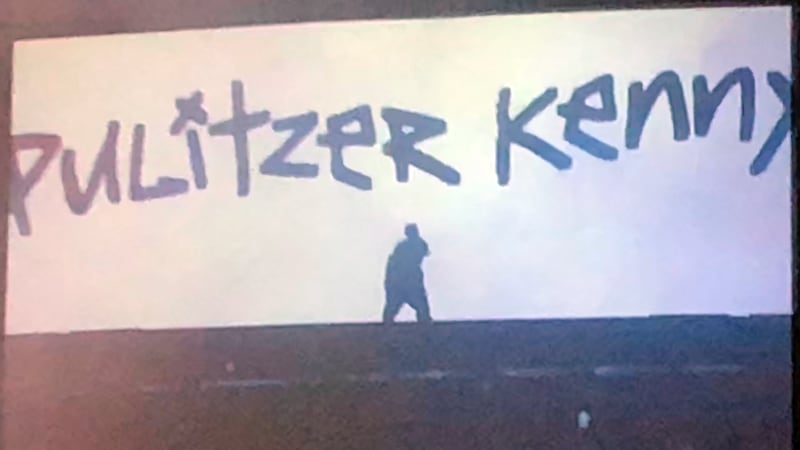Kendrick Lamar's stage entrance on the Top Dawg Championship tour is like the landing of a spaceship. For a good five minutes before Lamar appears, red lights flash in sync to otherwordly synths, while fog engulfs the stage. When Lamar finally breaks through the atmospheric haze, it's with the anti-Geraldo trap banger "DNA."
With this tour, Lamar and his labelmates are simultaneously claiming their place in history and staking out their spot in the future. Hung around the stage, there are banners displaying accomplishments from all seve artists on the tour: Schoolboy Q, Oxymoron, platinum, 2014; SZA, 5-time Grammy Nominee, NAACP Black Image Award, 2017. Only a few songs into his set, a giant screen on the stage behind Lamar flashes the phrase "Pulitzer Kenny." Whatever shift the award may or may not signal for rap and society, the award advances the Pulitzer organizations' credibility more than it does Lamar's—now with three masterful albums to his name, anyone who thinks Lamar needed a Pulitzer to secure his place in history has it backward. Fittingly, the only credential on Jay Rock's banner is "90059," the name of this last album and his South LA zipcode.
Related: The Pros and Cons of Kendrick Lamar's Pulitzer Prize.
TDE's stop at Sunlight Supply Amphitheater in Ridgefield, Wash., just north of Portland, was only the second date of the tour. Packed with festival kids and stylish tweens, the crowd felt as close to the zeitgeist as Southern Washington can get, and seemed all the more amped after bottleknecking at the unusually overzealous security.
But what was presented onstage was entirely meticulous. The Championship Tour is not a collaborative free-for-all—it's chiefly a Kendrick Lamar show. Lamar's set was by the far the longest, while the other sets were brief samplings heavy on hits. The amphitheater whomped to the infectious, driving rhythm of "Collard Greens," Schoolboy Q's single that's now almost four years old. Jay Rock, currently the most elusive member of TDE partially because he lacks a distinct persona, came onstage during Lamar's set to performed the lead single off his upcoming album, "King's Dead," which got a major boost from the Black Panther soundtrack. Rock tore through his verse on "Kings Dead" with breakneck speed, and hopefully his unreleased album will feature more of that fresh-out-the-gates fearlessness.
Only time will tell if TDE's first tour is really a juncture in music history—though it probably is—but it certainly represents a turning point in Lamar's career. If this tour is any indication, he's navigating the changing tide carefully. Surprisingly, a large chunk of his headlining set drew from 2012's Good Kid M.A.A.d City. It's a fitting reminder that Lamar's been making masterpieces since he first signed to TDE. But his set didn't quite have the looseness of his To Pimp a Butterfly tour, when performed with a full jazz-funk band, or the raw energy from back when he only performed with a DJ sounding an air horn after every song. For any of-the-people icon, it's an inevitable conundrum, but one Lamar now has to face on a new level, especially since he rules rap more as its oracle than its chief egoist.
The most fully realized set came from SZA. The R&B singer's recent and rapid ascent seems to have led to a stage presence that's more comfortable with being vulnerable. She performed songs exclusively from her rhythmic, organic debut Ctrl. Under spotlight and in front of a boxing ring installed for her set, SZA flexed her ethereal, ambitious voice in both improvisational interludes and singles "Love Galore" and "The Weekend." Before "Normal Girl," SZA gave an introduction that managed to seem candid in front of thousands of people: "You don't want to be cool, but you know how you want to be normal just to like get through the fucking day?"
It was a small moment, but one that was at felt entirely profound. If TDE is the group that will decide where the zeitgeist goes next, the rest of us should be glad to follow.
